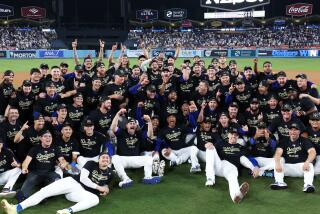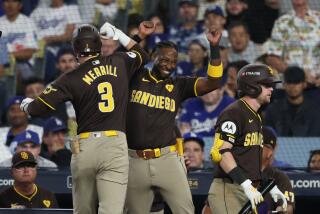Quiet Rookie Gives Padres a Real Earful : Greg Harris Prefers to Let His Pitching Do His Talking
- Share via
YUMA, Ariz. — He is quiet, in his voice and his walk and even in the way he pitches, almost as if he doesn’t want anybody to notice him.
In a way, Greg Harris doesn’t.
Somebody might find out that the man likely to be the Padres’ top 1989 rookie is no more than a kid from the North Carolina farming town of Siler City, population 8,500, where his father runs the Sears store and his mother works as a secretary at the high school.
“He took me to that town once,” teammate Eric Nolte recalled. “Aunt Bea lives there. I saw her.”
They might also discover that Harris wasn’t a prospect--wasn’t even a pitcher--at Jordan Matthews High School. Not only wasn’t he drafted out of high school, he wasn’t even given any full scholarship offers from colleges. He finally attended nearby Elon College on a partial scholarship.
“Only way that happened,” he said, “was because the college coaches had come to see somebody else and stumbled on to me.”
And if Harris isn’t careful, somebody might do a little checking and see that he finally moved to the mound only because he couldn’t hit. And when he blossomed there and was a Padre 10th-round draft pick in 1985, he was offered just a $6,500 bonus, which preceded some rather innocent negotiations.
“I didn’t think it was enough money, so I was going to keep them waiting, hoping that they would keep bumping it up,” Harris explained. “After a week, it had just gotten to $12,500, but I was getting scared that I was blowing my dream, the only chance I may ever had. So I gave in and signed.”
Harris isn’t sure he wants people knowing all this, in case they decide he’s really not as bold and big-time as his right arm, which Saturday morning was plenty of both. Those who braved the early morning chill for the Padres’ B game against the Angels were rewarded by seeing Harris put on a stirring pitching show.
The minor league star allowed a single to leadoff hitter Mike Ramsey, then retired 14 in a row--seven on strikeouts--to finish his five innings with a one-hitter and a minimum number of 15 batters faced (Ramsey had been caught stealing).
He helped the Padres to a 6-0 victory, which was followed by a 4-2 Padre victory over the Angels in the main game, played Saturday afternoon in front of a Desert Sun Stadium record crowd of 6,414. Not only did Harris’ performance help solidify his spot on the big-league team, it showed several scouts just how valuable he could be in a trade, which the Padres would make for the right slugger (i.e. Atlanta’s Dale Murphy).
“Was he tough? Are you kidding me?” pitching coach Pat Dobson said when asked about Harris, who he expects will open the season in the bullpen before moving into the rotation if somebody slips. “I don’t care if it was a B game or what, the important thing was that he was executing, every pitch, throwing first-pitch strikes to everybody. You can’t pitch any better than that.”
Harris won’t say that. He won’t even think it.
“I don’t look at things like I’m some first-round pick who can’t get cut or some star, because I ain’t either one,” Harris said. “I’m thinking, ‘I get injured, I’m out of here. I mess up, I’m gone.’
“Getting to the big leagues is all I ever dream about, whether it be here or Atlanta or Seattle. And I’m not going to make waves before I get there.”
Nolte, who has been Harris’ roommate throughout their careers in pro baseball, offers this footnote: “It’s like Harry (Harris) has told me before--to have gotten this far, he’s really surprised. And while he knows he’s good, he sure ain’t saying nothing about it.”
Part of this goes back to last season, when Harris learned that this game isn’t always what it seems, or how it feels.
In the spring, then-manager Larry Bowa wanted him to make the big jump from double-A Wichita--where he had been the organization’s minor league pitcher of the year in 1987--into the starting rotation. Bowa pitched him and touted him, and Harris finally buckled under the late spring heat and pressure and was sent to triple-A Las Vegas. He proceeded to go 9-5 there, with 147 strikeouts (second in the Pacific Coast League) and 65 walks in 159 2/3 innings.
After he helped the Stars to the PCL championship, he was called up to San Diego in September and promptly run out to the mound in a relief role in Cincinnati.
“I get out there and realize that this is what my Dad and I have been dreaming about for 23 years, and I am so nervous, I’m in awe,” recalled Harris, 25. “I look over and see Pete Rose and can’t believe it. It’s like, now he’s watching me ?”
Before Harris could look up again, he had allowed four hits and two runs in his first inning.
“I had to say, ‘Wait a minute, this is the same game my Dad and I played over at the elementary school,’ ” Harris said. “I realized, to come that far from those days, there ain’t no pressure.”
And so suddenly there wasn’t. His next appearance was a start against Houston in San Diego. He asked his parents to fly out and watch him because he wasn’t sure he would ever have this big-league chance again. He then earned many chances by pitching a four-hitter in a 9-1 victory, striking out 11 and walking three. Then five days later against the Astros in Houston, on the last weekend of the season, he relieved starter Ed Whitson in the third inning and pitched seven shutout innings in a 5-1 victory.
“What he did today,” Manager Jack McKeon said Saturday, “isn’t anything different from what he showed us last year. We know he can pitch.”
The reason he will start the season in the bullpen instead of the rotation? Simple. The Padres already have a rotation, baseball’s only five-man rotation where each member pitched more than 200 innings last year.
“What do you want to do, shake up our starting staff of veterans who have been there?” McKeon asked. “What do I do, tell Ed Whitson that his great year doesn’t mean anything, that his 10 seasons don’t mean anything? Let’s see what Harris does up here consistently, then we’ll talk.”
That’s fine with Harris: “I like being the underdog, nobody noticing me,” he said. “It’s always been that way.”
It helps when you don’t throw hard, but tricky, with a little cut slider and unique changeup, the kind that makes hitters stare at the plate on the way back to the dugout. Nobody sends up fireworks over that kind of pitching.
“Doesn’t that boy throw any fastballs?” marveled one scout Saturday.
It also helps when you talk softly, with a voice of syrup and a background that belongs on afternoon television.
“We still play catch when he comes home,” said his father Jimmy from Siler City, located in the middle of North Carolina. “Except I can’t get behind the plate and catch him anymore. He’s gotten way too old for that.”
Said Nolte: “You know how small his town is? He lives on Wade Road, which was his grandfather’s name. That’s how small it is.
“We go to his high school and all the girls are saying, ‘Greg Harris is here, he’s here, he’s here.’ We go to this place called Chris’s Burger and order a burger and slaw and everybody knows him. That’s how small it is.”
Harris said that everything is so simple back there, it’s been easy to make things simple up here.
“We used to play at the Silk Hope Grammar School, me and my dad,” Harris recounted. “It was no big deal then, and it’s no big deal now.”
And, perhaps, not any pitch or hidden motivation is his secret.
Said Nolte: “There’s no pressure on him. This is a guy who still sometimes wears overalls. You don’t think he’s already beaten some odds?”
Padre Notes
The hitting star of the Padres’ Saturday doubleheader sweep was Bip Roberts, who played second base and had three hits in the B game, then moved to left field and added a hit in the main game. Roberts must prove proficiency at several positions if he is to wrest one of the utility spots away from such candidates as outfielders Shawn Abner, Shane Mack and Jerald Clark and infielder Gary Green. “Bip would give us help in the infield, outfield and give us speed,” Manager Jack McKeon said. “It certainly helps on one of my teams if a guy can be versatile. That way we can get him a lot of work and keep everybody happy. With Bip, it all comes down to which way we decide to go in the end.” Although Roberts is just 25, he is making a comeback of sorts, having begun the 1986 season as the everyday second baseman but struggling and losing the job and ending the year hitting .253 with one homer and 12 RBIs. After that, he virtually disappeared from the Padres’ plans until he reappeared late last season, going three for nine for the Padres after being recalled from triple-A Last Vegas, where he had hit .353. “I’m more mature now, I’ve grown up,” Roberts said. “I’ve learned if I can help the club in any way, I will. Before I took things for granted. Not anymore.” . . . Another early Padre hitting star is Jerald Clark, who went two for three with three RBIs in Saturday’s B game to make him five for eight thus far for the weekend. He credits his fast start to a winter spent in the batting cages near his Las Vegas home. “Not like real batting cages, but the cages they have at putt-putt golf courses,” he said. “You get in one of them, you don’t know where the pitching machine is putting the ball. It helps your reflexes. Hit a few balls, play a few video games, ride those little cars, go on home. It’s a great winter.” . . . Greg Harris wasn’t the only outstanding Padre pitcher Saturday. In the main game, Dennis Rasmussen (three scoreless innings), Ed Whitson (two unearned runs in three inings) and Eric Nolte (three scoreless innings) combined to make pitching coach Pat Dobson smile. “These guys are picking up right from last year, doing things I taught them before, not needing a lot of reminders,” he said. “You bet I’m happy.”
More to Read
Go beyond the scoreboard
Get the latest on L.A.'s teams in the daily Sports Report newsletter.
You may occasionally receive promotional content from the Los Angeles Times.








